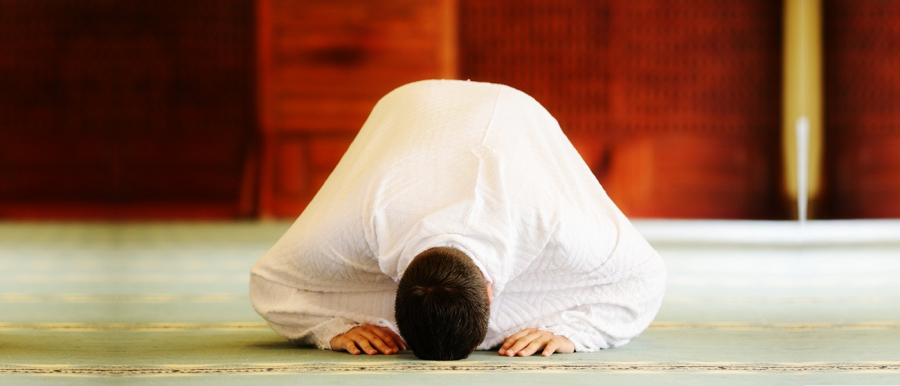Islam considers Praying (Salat) five times a day [1] as one of the most important practical principles. The more times one does something, the more it becomes part of him/her and his/her character; so does prayer. Also, if there were just one prayer a day, people would be more at risk of skipping it by telling themselves: it is only one! Let’s do it tomorrow! But, essentially, why should Muslims perform the daily prayers? Here are some of the answers to this question.
Daily Prayers in Islam (Salat) Help to Be Always Clean
Of the prerequisites of the prayer is the purity of the body from major impurities [i], minor ones [ii], and the purity of clothes and place. These conditions need a state of physical and spiritual cleanliness to stand before God. So, praying five times a day bounds Muslims to take a bath regularly, wash the face and hands at least five times a day.
These are the practices of personal and public hygiene. According to Prophet Muhammad (PBUH), the prayers act like a river passes nearby one’s house: “If there was a river at your door and you took a bath in it five times a day, would you notice any dirt on you? That is the parable of the five prayers by which Allah removes sins from one’s soul.”[1].

Moreover, several narrations recommend wearing perfume and brushing the teeth before ablution (Wudu) and prayers (Salat) [2,3,4]. These and other narrations, emphasize the importance of appearing clean in public and private.
Daily Prayers in Islam (Salat) Promote Solidarity among Human beings and End Social Rankings
Muslims, all, should pray in the same uniform way, and manner, facing the same direction. No matter what their social position is, where they are on this planet, and what language they speak. This, particularly, means that all human beings are the same before God. Moreover, all the identical acts and words during prayer and positioning towards the same direction, are the practices of promoting solidarity among Muslims, especially when repeated at some times every day.
Becoming Organized by Praying every day
Praying five times a day at certain intervals is an important tool. Since it allows a Muslim to organize his/her day, be aware of time, practice and take the control over his/her daily life.
Spiritual Impacts of Daily Prayers in Islam (Salat)
-
Becoming more Confident
Much of what we say in our prayers is actually asking for divine help to be righteous in our decisions and actions. And, God has promised in the Quran to respond to whoever that calls him (40:60). This gives a good feeling. Knowing that a kind, wise and superior power hears us and will help us through the hard moments. He also makes us more confident and determined in our decisions.
-
Inner Peace
Just as we need food to meet our physical needs, Islam teaches us to pray and worship to get the food for our souls. That is inner peace and tranquility.
-
Fewer Errors and Sins
One of the main objectives of daily prayers (Salat) is to remember God. It also helps to purify ourselves and keep away all the evil thoughts and actions. "Indeed, prayer prohibits immorality and wrongdoing ... And Allah knows that which you do." (29:45).
Prophet Muhammad (PBUH) said that Satan is afraid of the faithful Muslim who performs the prayers (Salat) in their right times. Once a Muslim forgets to do the prayer at the right time, Satan becomes encouraged to tempt him/her to do great sins [5].
If we once do wrong to someone, we will be ashamed of him/her, or we do not even dare to face him/her the next time we meet. Prayer has the same effect. It is the confrontation of one's conscience, knowing that nothing can be hidden from God, whether manifested or concealed. Then, it becomes more difficult to commit evil deeds when we have to stand five times a day in front of God who knows every detail about us.

-
Remembering the Philosophy of Life
Another purpose of prayer for a Muslim is to remember. At fixed intervals, no matter how busy a Muslim is, he/she might ask himself, “OK, why am I here, what do I do in this world?” Also, prayer helps Muslims to be accountable for their daily actions which greatly change their perceptions of life.
On top of everything, worshiping God is the purpose for which the humankind was created: “And I did not create the jinn and mankind except to worship Me.” (51:56).
Last but not least, what do we usually do to one who has done a favor to us? The answer is: try our best to compensate, or at least to thank him/her even several times. Now, how can we compensate the blessings that God has given us? It is not possible! Then, we pray to thank Him for all the wonderful, beautiful blessings that He has given us. Although we do not deserve many of them.
Notes:
[i] Can be removed by ritual bathing (Ghusl)
[ii] Can be removed by ablution (Wudu)
References:
[1]. Ibn Babawayh, “Man la yahduruhu al-Faqih”, vol.1, p. 316.
[2]. M. al-Kulaynī, “Al-Kafi”, vol. 5, p. 511.
[3]. M. al-Kulaynī, “Al-Kafi”, vol. 5, p. 515.
[4]. Ibn Babawayh, “Al-Khisal”, p. 481.
[5]. Ibn Babawayh, “Uyun akhbar al-Rida”, ch. 30, T. 21.



















